The Merchants Trust (LON:MRCH) offers investors the potential for long-term capital growth along with a high and growing level of income. Helped by the refinancing of the trust’s high-cost, long-term debt, for FY20 (ending 31 January) the board’s intention is that MRCH’s annual dividend will be at least 4.2% higher year-on-year. Manager Simon Gergel at Allianz Global Investors (AllianzGI) is optimistic about the trust’s prospects, citing a broad opportunity set due to attractive valuations in the UK stock market. He says that at some stage the deeply depressed sentiment towards UK shares should improve, which could lead to a meaningful revaluation of the domestic market.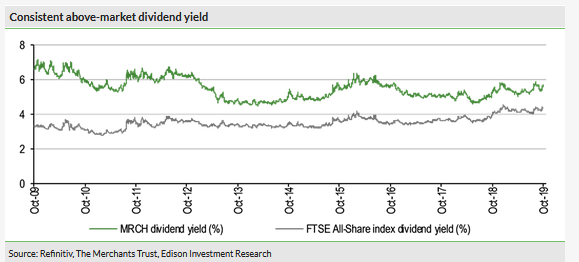
The market opportunity
Brexit uncertainty has weighed heavily on the UK stock market, which in aggregate is now trading at a 17.3% discount to the world market on a forward P/E multiple basis. Cyclical stocks and companies with domestic operations are trading on very undemanding valuations, which may offer a good opportunity for investors with a longer-term horizon.
Share price/discount performance
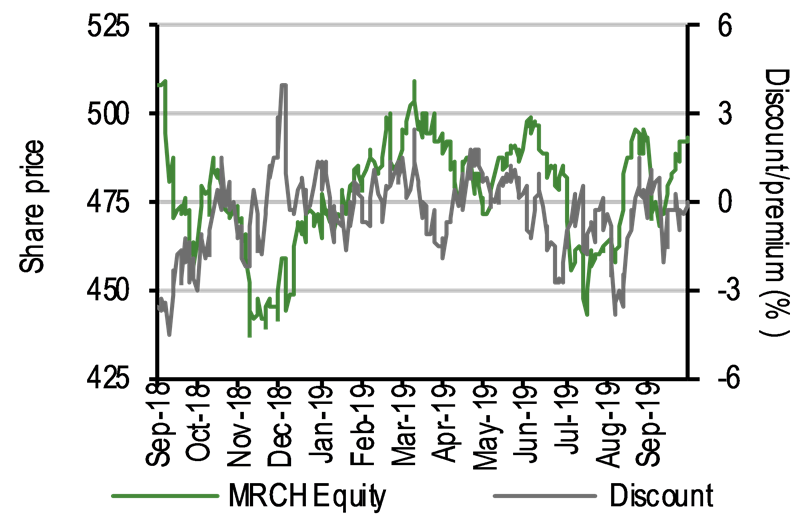
Three-year performance vs index
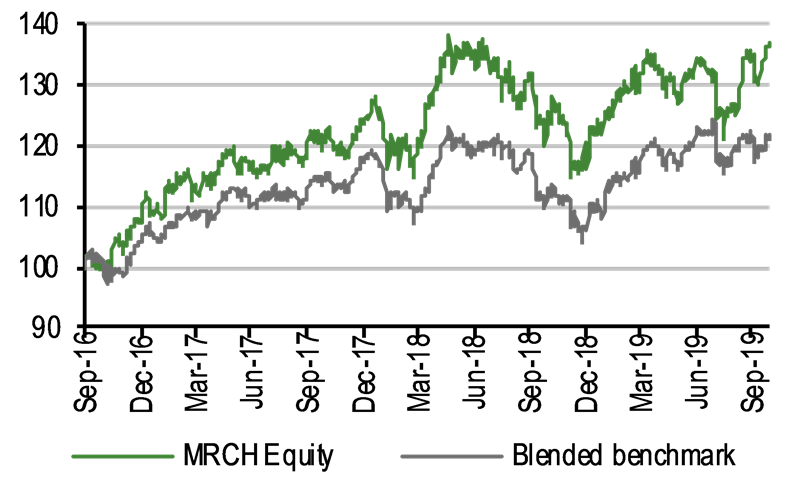
Why consider investing in The Merchants Trust?
- Attractive 5.4% dividend yield. The board has indicated a minimum 4.2% increase in the FY20 distribution (the 38th consecutive annual increase).
- Long-term record of outperformance versus the UK stock market; the manager follows a disciplined, fundamental approach to stock selection.
- Significantly lower interest costs following the refinancing of the trust’s high-cost, long-term debt.
- Low management fee and experienced independent board.
Following re-rating, regularly trades close to NAV
Despite Brexit uncertainty, MRCH has re-rated from a c 6% discount and now regularly trades close to NAV. The current 0.1% share price discount to cum-income NAV compares with the average 0.4%, 3.7%, 3.7% and 2.2% discounts over the last one, three, five and 10 years respectively. MRCH has a progressive dividend policy and offers an above-market 5.4% yield.
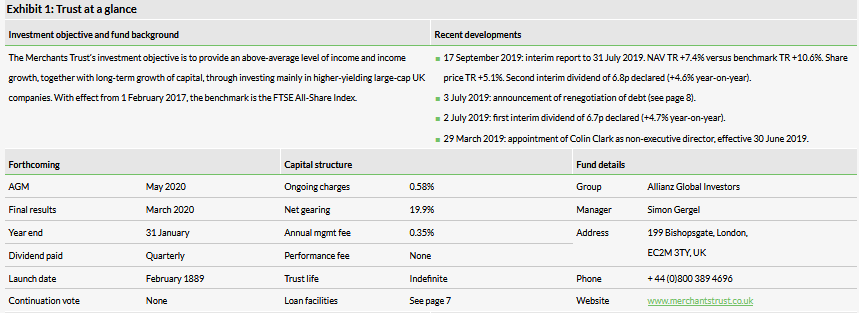
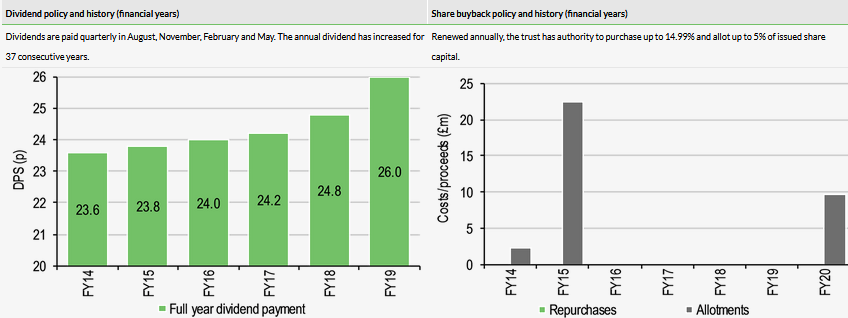
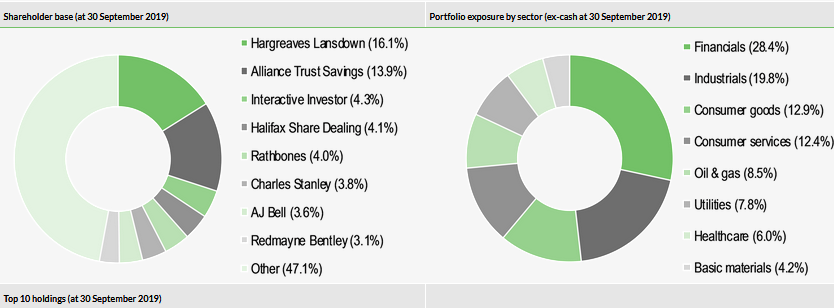
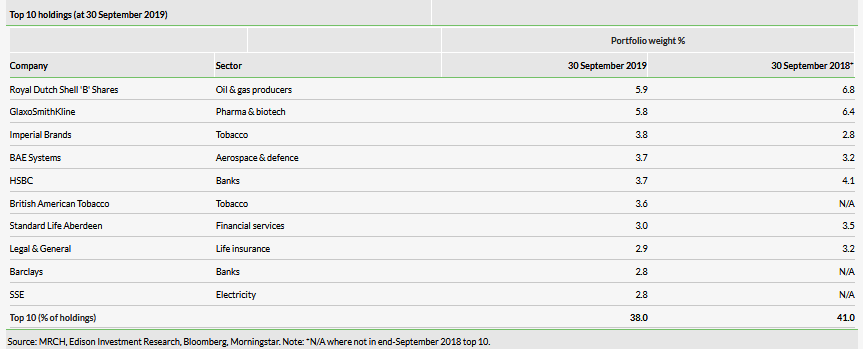
Market outlook: Potential alleviation of Brexit discount
Exhibit 2 (LHS) shows how much UK shares have de-rated since the Brexit vote in June 2016. The Datastream UK index is currently trading on a forward P/E multiple of 12.7x, which is a 17.3% discount to the world market, considerably wider than the 6.1% five-year average discount.
Looking more closely at the performance of the UK market so far this year, investors have continued to gravitate towards growth and perceived ‘safe-haven’ stocks, shunning more cyclical operations and firms with domestic businesses. This has resulted in very attractive valuations in certain areas of the UK market, which may present exciting opportunities for investors willing to look through the current uncertainty due to Brexit negotiations.
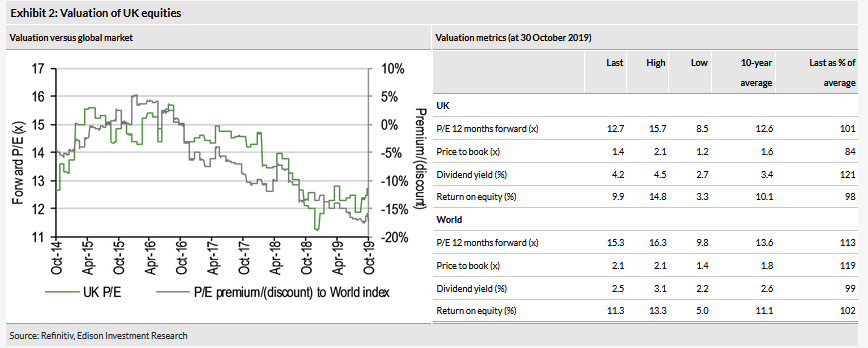
Fund profile: Still going strong after 130 years
This year, MRCH is celebrating its 130th anniversary. Notable events in its launch year of 1889 include the opening of the Exposition Universelle (World Fair) in Paris, with the recently completed Eiffel Tower serving as the entrance arch; the founding of the Society for the Protection of Birds, the precursor to the RSPB; and the first publication of the Wall Street Journal. The trust was originally set up to gain exposure to the expansion of North American railways and was subsequently diversified by geography and sector, investing not only in equities, but government fixed income securities. Its initial assets under management were £1.4m.
Since 2006, MRCH has been managed by Simon Gergel, chief investment officer for UK equities at AllianzGI. Gergel has 32 years of investment experience and works closely with two other members of the UK investment team, Matthew Tillett (portfolio manager) and Richard Knight (associate portfolio manager). The manager aims to generate an above-average level of income and income growth, and long-term capital appreciation from a diversified portfolio of c 40–60 UK stocks. Although MRCH’s performance is benchmarked against the FTSE All-Share index, the manager employs a contrarian investment approach, seeking undervalued equities that can be held for the long term. To mitigate risk, he operates within investment guidelines; MRCH must be invested in at least half of the 10 market sectors, with a maximum of 35% of the portfolio in any sector and a single investment may not exceed 15% of assets. At the time of drawdown, gearing in a range of 10–25% of NAV is permitted; at end-September 2019, net gearing was 19.9%.
The trust offers an attractive 5.4% dividend yield, which is the highest of the 13 largest funds in the AIC UK Equity Income sector; it is on track for 38 consecutive years of dividend growth.
The fund manager: Simon Gergel
The manager’s view: UK valuations are appealing
Considering the UK versus the rest of the world, Gergel says the UK is one of the cheaper markets; he suggests this is largely due to Brexit uncertainty as the economy has been ‘pretty resilient’ so far. There have been significant outflows from the UK stock market, especially in thinly traded smaller companies, putting pressure on stock prices. The manager notes that higher fund flows into passively rather than actively managed funds, and into certain quality and growth styles, have also led to exaggerated share price moves, as outperforming stocks continue to be purchased. This behaviour has led to a polarisation in the UK market as poorer-performing stocks continue to lag. Gergel suggests the disparity between growth and value stocks is at an extreme. He says it is difficult to call a turn in market leadership, as high-growth companies benefit from reduced interest rates, which lower the discount rate on their future income streams. However, the manager feels the trade has gone too far and notes that bond yields have started to rise. As a result, he says ‘there are great opportunities at the value end of the market’.
The manager suggests the UK’s lack of favour with global investors – which is especially evident in fund manager surveys – is providing a good opportunity, particularly if there is increased clarity surrounding Brexit. Gergel says that uncertainty surrounding the UK’s departure from the European Union is beginning to have a noticeable negative impact on the UK economy, although he is surprised the effects are only now becoming apparent. He cites a number of recent weak trading statements as evidence of slower consumer spending, along with lower investment intentions at the corporate level and stalling house prices. The manager says that anecdotally there is more bad news from companies, although some of this is a result of a global slowdown, which has affected the automotive and semiconductor sectors in particular. He adds that ‘the US-China trade issue does not help and Brexit provides an excuse not to do things’.
However, Gergel is not especially pessimistic on the macro backdrop, despite a slowing global economy. The world has experienced a long economic expansion, but it has not been particularly buoyant, so the manager suggests any slowdown could be modest and a recession may be avoided. He says that ‘valuations are looking good for UK investors’ and notes the potential for an increase in UK government spending and reduced political risk, as the Labour party is looking less electable. Regarding the upcoming general election, the manager suggests the UK stock market would rally if Labour does poorly in the vote.
Asset allocation
Investment process: Disciplined fundamental approach
Gergel is a member of AllianzGI’s well-resourced investment team, which along with fund managers and equity analysts includes specialists in macroeconomic, credit and environment, social and governance (ESG) research, as well as the company’s proprietary Grassroots market research team. He believes that stock markets are inefficient and that thorough fundamental research can uncover undervalued securities.
MRCH’s buy discipline is a blend of three inputs: fundamentals (industry dynamics, a company’s competitive position, its financials and its ESG track record); valuation (in absolute and relative terms versus history, the sector and the market and dividend yield); and themes (analysis of the macroeconomic outlook, the business cycle and industry/secular themes). Shares may be sold if they are fully valued, there is a change in the investment case, or if a better investment is identified.
The manager shows that MRCH’s portfolio can be broken down into four ‘buckets’:
High yield (c 32% of the portfolio, ex-cash, at end-August 2019) – undervalued companies with a high dividend yield, such as Royal Dutch Shell and Imperial Brands. Expected return is from dividends and revaluation. The manager stresses that when a company has revalued, it is time to exit.
Cyclical growth (c 35%) – companies that can grow over a cycle, but may have economic or market sensitivity, such as HSBC and CRH. Expected return is from revaluation, compounding growth and dividends. This is where Gergel is finding the most investment opportunities.
Defensive growth (c 23%) – firms that can grow with limited economic sensitivity, such as GlaxoSmithKline and BAE Systems. Expected return is from dividends, compounding growth and potentially revaluation.
Special situations (c 7%) – companies undergoing a turnaround or restructuring, such as Barclays and Morgan Advanced Materials. Expected return is primarily via capital appreciation as their shares are revalued.
In addition to the investment categories noted above, there are particular themes represented in MRCH’s portfolio, which include:
exposure to consumer spending growth in emerging markets (positions include Inchcape, PZ Cussons and Prudential);
multinational companies trading on UK valuations (positions include Keller, National Express and SThree);
modestly valued recovery situations (positions include Balfour Beatty, Bovis Homes and Morgan Advanced Materials); and
beneficiaries of digitisation (positions include GVC Holdings, Kin + Carta and IG Group).
Current portfolio positioning
At end-September 2019, MRCH’s top 10 positions made up 38.0% of the portfolio, which was modestly less than 41.0% a year earlier; seven positions were common to both periods. As shown in Exhibit 3 below, there has been very little change in the structure of the fund in market cap terms over the last 12 months.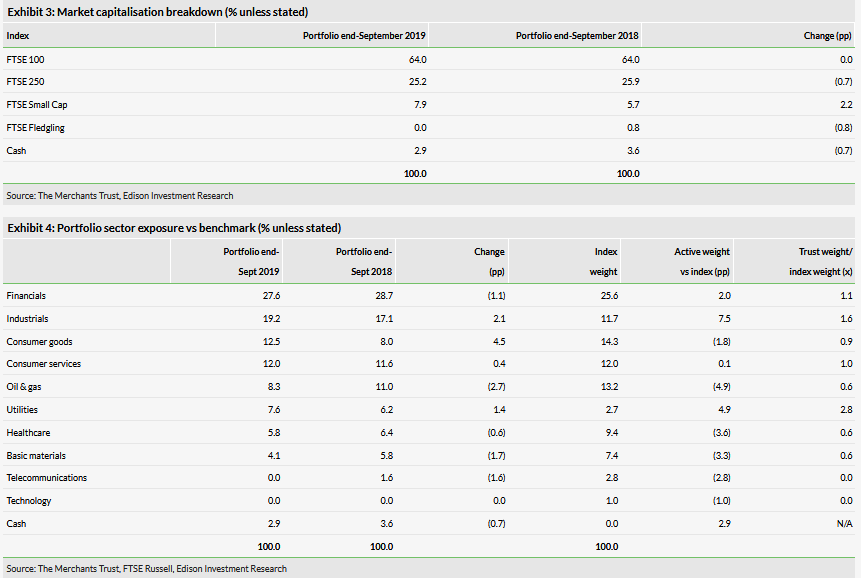
Looking at MRCH’s sector exposure in Exhibit 4, the largest changes in the 12 months to the end of September 2019 are a higher weighting in consumer goods (+4.5pp) and less exposure to oil & gas stocks (-2.7pp). The manager’s unconstrained investment approach is illustrated by the trust’s 7.5pp and 4.9pp overweight positions in the industrial and utility sectors respectively, with a 4.9pp underweight to the oil & gas sector, and no exposure to telecoms or technology.
Below we highlight changes in MRCH’s portfolio since our last note published in May 2019.
There is a new position in Stock Spirits, the leader in the Eastern European spirits market, with a number one position in the Czech Republic, number two in larger market Poland (54% of the company’s sales), and smaller operations in other countries including Italy. Gergel explains that the firm has a relatively new management team and there have been changes to its sales and distribution teams. AllianzGI undertook a Grassroots study on the clear vodka market in Poland and Stock Spirits received very positive feedback. The company has been gaining share, not due to lower pricing, but as a result of its perceived quality and image, helped by its increased investment in marketing, which can encourage customers to trade up to higher-priced products. Stock Spirits is trading on a modest valuation while investors wait to see more evidence of the company’s progress, particularly against its larger, but more traditional and more indebted Russian competitor.
Inchcape, another new holding, is a luxury car distributor and retailer, whose businesses include operating as Toyota’s distributor in Hong Kong and Singapore, providing marketing, spares and finance services. The company is increasing its emerging markets presence, using its global skills, including digital capabilities. Inchcape is selling off its low-profit, asset-intensive businesses, such as some of its UK and Australian retail sites and its UK fleet operations, to focus on areas with higher returns on capital. The company is trading on a modest valuation due to its association with the cyclically weak auto industry. This is a firm that Gergel knows well; it was a successful position in MRCH’s portfolio in the past.
The newest position in the fund is sofa company DFS. It has a 34% market share, which is multiple times larger than the number two industry player. The manager had been considering buying shares in this company for a long time, but as its business is cyclical, he needed to be careful on timing the purchase. Gergel says that sofas are a high-value product that customers like to look at and feel, which makes DFS less at risk from online competition. He adds that the company has relatively few outlets as they are seen as ‘destination stores’ and customers are prepared to travel to them, while it has been able to negotiate good reductions in its rental leases. The manager says that DFS is well managed and has grown organically and via acquisitions; it now has four brands – DFS, Dwell, Sofa Workshop and Sofology. He believes that although the company’s current trading conditions are ‘tough’, its shares could perform well once there is increased clarity around Brexit.
There are two relatively recent disposals from the portfolio: Ashmore (an emerging market fund manager that had performed well and which Gergel deemed to have reached fair value); and Inmarsat (a satellite company that received an acquisition bid from a consortium of private equity firms). In addition, the position in Greene King was meaningfully reduced following a takeover bid.
Performance: Recent improvement in performance

In H120 (ending 31 July), MRCH’s NAV and share price total returns of +7.4% and +5.1% respectively trailed the benchmark’s +10.6% total return. The best relative contributors to performance were the positions in Inmarsat (+0.5pp) and Standard Life Aberdeen (+0.4pp), as well as not holding Glencore (+0.4pp), while the main negative contributions came from Hammerson (held) and AstraZeneca (not held), which both detracted by -0.7pp.
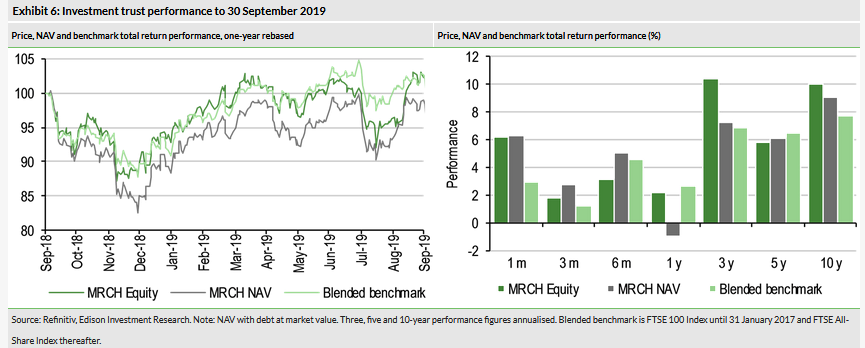
Gergel says that in the run-up to the 31 October 2019 Brexit deadline (prior to the most recent extension to 31 January 2020), MRCH’s performance improved rapidly, helped by a lack of ‘blow-ups’ in the portfolio. Greene King’s share price rallied by c 50% in mid-August following an acquisition bid from Hong Kong-based company, CKA. The trust’s real estate holdings, Hammerson and Land Securities, also performed better in anticipation of a favourable Brexit outcome, while gaming firm GVC Holdings issued a positive trading statement and its CEO has been buying the company’s shares.
Exhibit 7 shows MRCH’s relative returns. An improvement in recent performance means the trust is now ahead of its blended benchmark over both three and 10 years in NAV and share price terms.
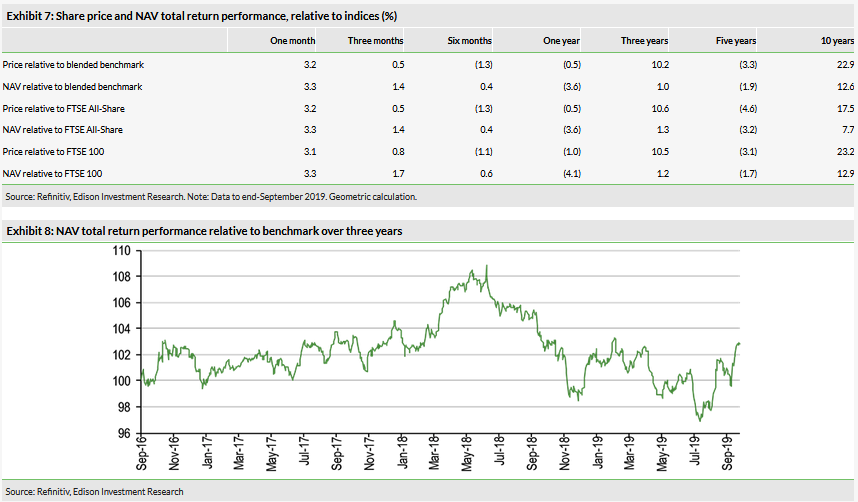
Discount: Significant re-rating
Exhibit 9 shows MRCH’s valuation over the last three years; starting in H218, the trust meaningfully re-rated from a c 6% discount and now regularly trades close to NAV. The current 0.1% share price discount to cum-income NAV compares with the range of a 3.9% premium to a 4.6% discount over the past 12 months and the 0.4% to 3.7% range of discounts over the last one, three, five and 10 years. Gergel believes that MRCH’s higher valuation is significant given the Brexit uncertainty and is due to a combination of better investment performance, the trust’s higher yield and the refinancing of its high-cost, long-term debt. He also highlights marketing initiatives undertaken to increase the breadth of MRCH’s shareholder base; there is now a higher number of smaller-ticket platform investors, which has helped increase liquidity in the trust’s shares. During FY20, the board has been issuing shares at a premium; in H120, 1.3m shares were allotted (1.2% of the share base), raising c £6.3m.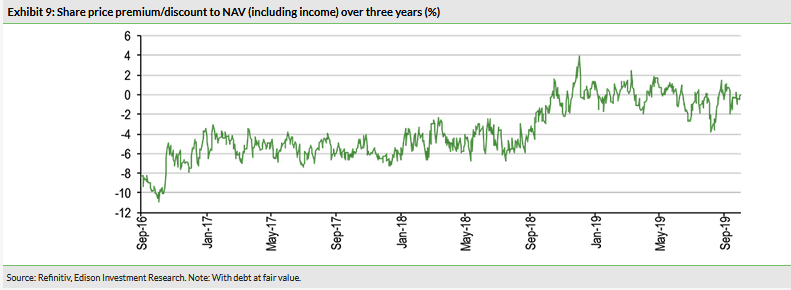
Capital structure and fees
MRCH is a conventional investment trust with one class of share; there are 110.7m ordinary shares in issue. Following on from the repayment of the trust’s £34m, 11.125% debt in January 2018, on 3 July 2019, the board announced that MRCH had entered into a £42m three-year revolving credit facility (RCF) with Scotiabank Europe. The proceeds of this were used to partially pay down its £42m 9.25% 2023 Fintrust debenture (total redemption cost of £56.2m plus accrued interest; the balance was funded from existing assets). While the cost of redemption reduced MRCH’s NAV per share by 0.5% (2.3p) with debt at fair value, annual interest cost savings will be 2.6p per share.
Restructuring MRCH’s debt has meaningfully reduced its effective interest rate from 8.5% in January 2018 to its current level of 3.5%. Gergel highlights that while the latest reduction in interest paid will provide a significant benefit to earnings and capital costs (65% of interest costs go through the capital account), it will also introduce an element of flexibility as the repaid Fintrust debenture was fixed. The manager will now be in a position to deleverage somewhat if markets rally and valuations are less attractive, although he stresses that he will not be taking short-term views on the direction of the UK stock market. Gergel reports that shareholder feedback on MRCH’s latest refinancing initiative has been overwhelmingly positive.
AllianzGI is paid 0.35% pa of the value of MRCH’s gross assets (minus current liabilities, short-term loans and any funds within the portfolio managed by AllianzGI), allocated 65:35 between the capital and revenue accounts respectively, reflecting the board’s expected split of long-term returns between capital and income. In FY19, the ongoing charge of 0.58% was 1bp lower year-on-year.
Dividend policy and record
MRCH pays quarterly dividends, generally in August, November, February and May. In FY19, the annual dividend was 4.8% higher year-on-year and was c 1.1x covered. The 4.8% dividend growth was meaningfully higher than 2.5% in FY18 and 0.8% in the prior three financial years. At the end of FY19, the trust had revenue reserves of £28.3m (c 1x the FY19 dividend payment). These may be used to smooth dividend payments in years of lower income; they were last drawn on in FY17.
The board has announced that it intends to at least maintain the second FY20 quarterly dividend of 6.8p per share in the following two quarters, meaning a minimum 27.1p per share dividend for the year, which would be up 4.2% year-on-year and a 38th consecutive increase in the annual distribution. As shown in Exhibit 10 below, over the last 37 years, MRCH’s dividend has compounded at an annual rate of 7.0% pa, considerably higher than the 2.9% annual inflation rate over the period.
Gergel explains that the trust’s dividend growth in recent quarters has been helped by reasonable income growth from portfolio companies, sterling weakness and refinancing its debt at more favourable rates. Over the last two to three years, the manager has diversified MRCH’s income stream: the portfolio now has less exposure to high-yielding, low-growth companies (such as in the oil & gas sector) and more to firms with higher rates of dividend growth.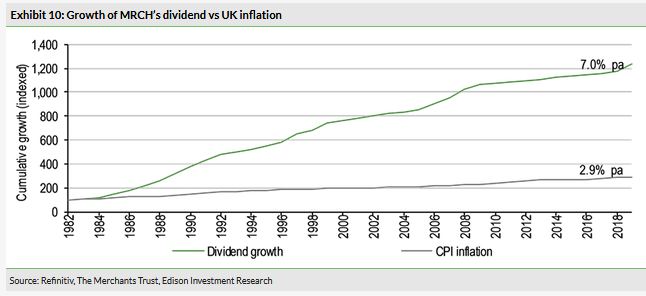
As shown in the chart on page 1, MRCH offers a competitive dividend yield, consistently higher than the yield on its benchmark, the FTSE All-Share Index. Based on its current share price, the trust yields 5.4%.
Peer group comparison
In Exhibit 11, we show the 13 funds in the AIC UK Equity Income sector with market caps above £300m. MRCH’s NAV total returns are above the selected peer group average over the last 12 months, in line over three years, ranking eighth in both periods, while lagging over five and 10 years. Following a meaningful re-rating, the trust now has the narrowest discount in the selected peer group (two funds are trading at a premium to NAV). MRCH’s ongoing charge is in line with the mean. It has the highest level of gearing and offers a generous 5.4% dividend yield, the highest in the selected peer group and 1.3pp above average.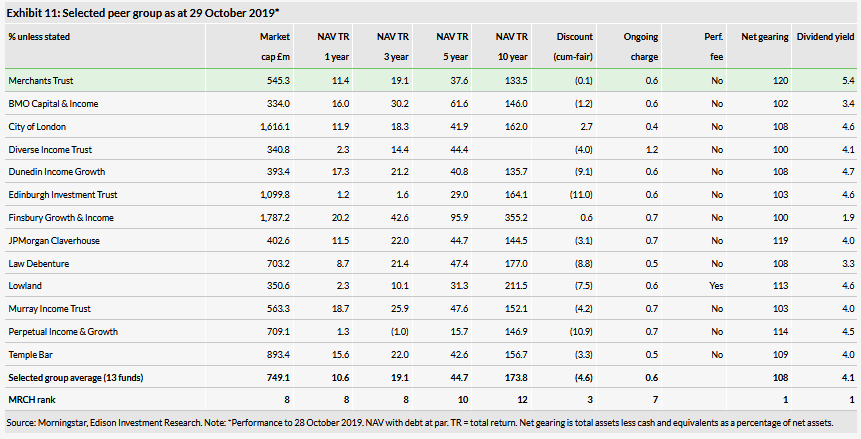
The board
MRCH’s board has five directors, all of whom are non-executive and independent of the manager. Chairman Colin Clark was appointed relatively recently, having joined the board on 30 June 2019 and assumed his current role on 1 September 2019 following the retirement of Simon Fraser. The four other directors are: Sybella Stanley (senior independent director, appointed in November 2014); Timon Drakesmith (chairman of the audit committee, appointed in November 2016); Paul Yates (appointed in March 2011); and Mary Ann Sieghart (appointed in November 2014). MRCH’s board is proud of its gender diversity and broad investment/corporate commercial experience.